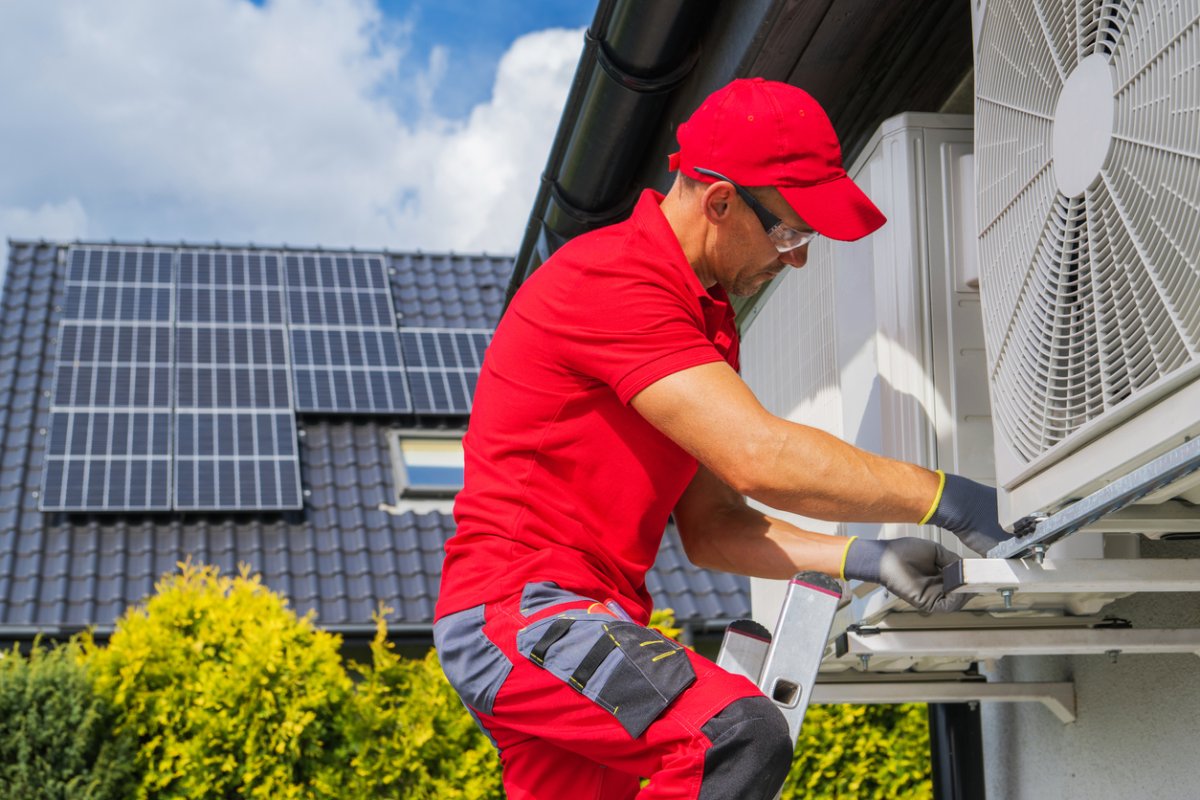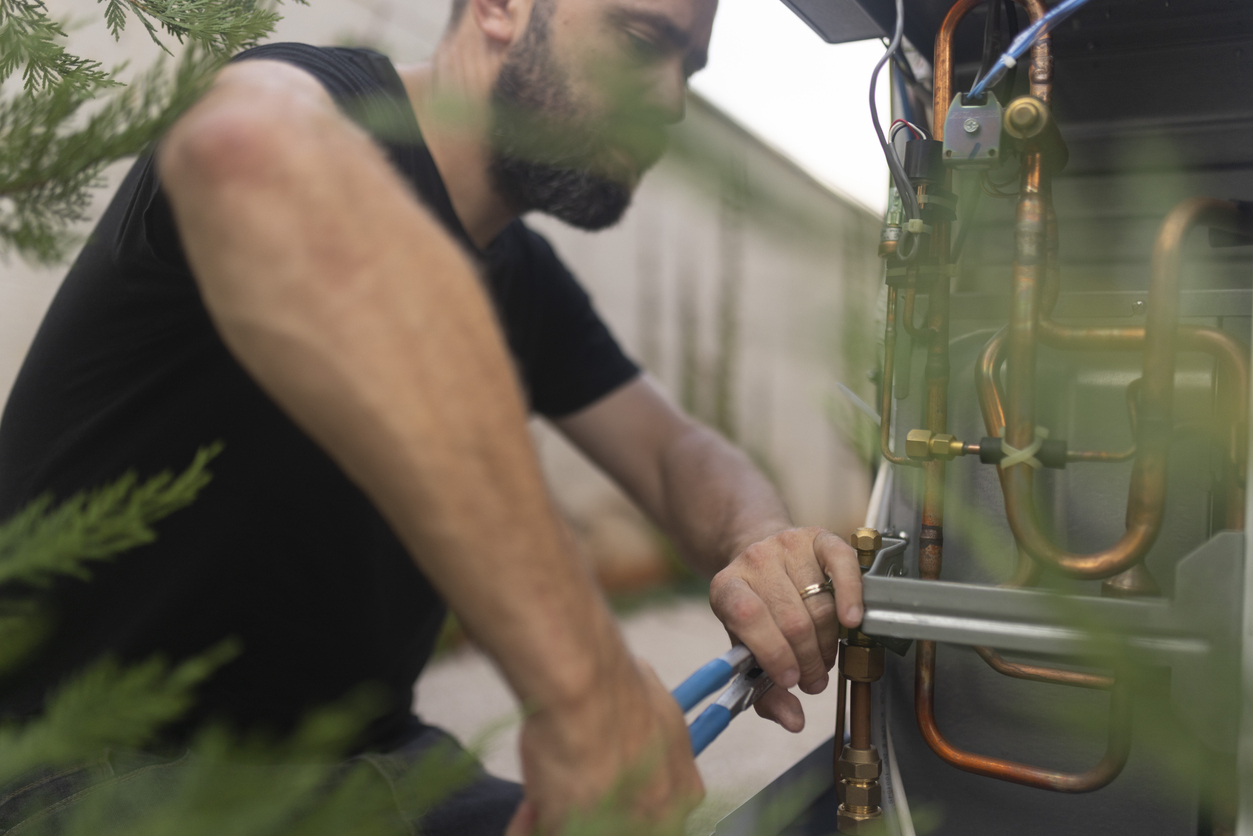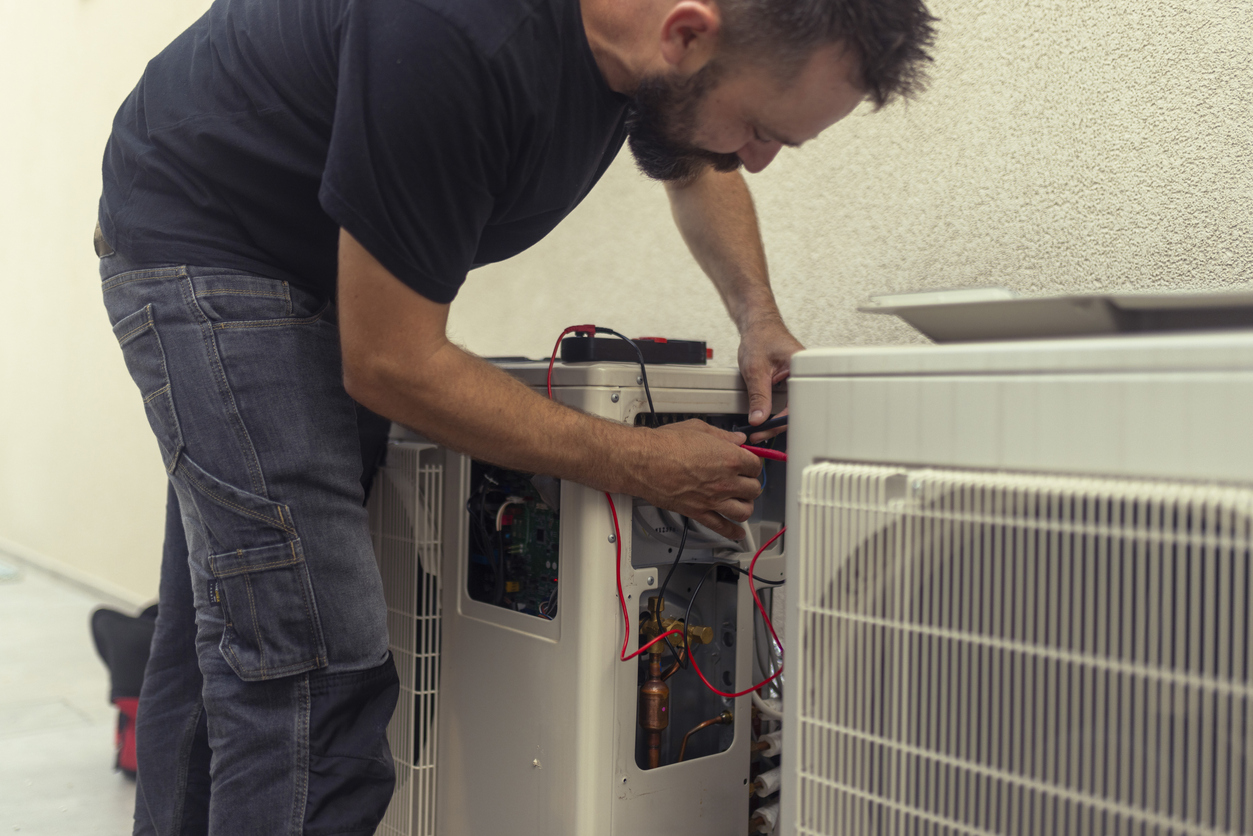

We may earn revenue from the products available on this page and participate in affiliate programs. Learn More ›
When it comes to homeowners deciding between installing a heat pump or an AC unit, the cost factor is a significant consideration and the choice can impact comfort and utility bills for years to come. AC unit cost can vary depending on factors such as brand, size, and energy efficiency. An energy-efficient air conditioner may have a higher initial purchase price, but it can significantly lower the long-term operating costs compared to an older, less-efficient unit. If a homeowner is considering an air conditioner with heat capabilities, they’ll need to factor in the cost to replace the AC unit with a hybrid system. The up-front investment can pay off over time by providing both cooling and heating capabilities in a single unit.
The cost of a heat pump, including installation, can be higher than that of a standard AC unit, but it’s important for homeowners to consider the long-term savings. As one of the popular HVAC installation trends, heat pumps are renowned for their energy efficiency, making them an attractive option for those seeking to reduce their utility bills. Installation costs will vary for a heat pump window unit or a ductless heat pump, but they can provide efficient heating and cooling for specific areas of a home.
The heart of a heat pump is its compressor, which is responsible for transferring heat between the indoors and outdoors. A well-maintained heat pump compressor is crucial for optimal performance and energy savings. Investing in regular maintenance can help homeowners extend the lifespan of a heat pump and ensure it operates efficiently.
The heat pump vs. AC cost decision involves several factors. While the up-front cost may lean in favor of a traditional AC unit, considering factors like energy efficiency, heat pump installation cost, and the long-term benefits can sway the decision in favor of a heat pump. Ultimately, the choice will need to align with a homeowner’s specific requirements, budget, and climate conditions. Weighing these factors carefully, possibly with the help of a pro, can help homeowners make a sound investment when considering HVAC unit replacement cost.
1. Heat pumps have a higher up-front cost than traditional air conditioning units.
Heat pumps typically come with a higher initial investment compared with traditional air conditioning units. This higher up-front cost is one of the key factors for homeowners to consider when deciding between the two HVAC systems. Heat pumps are designed to provide both cooling and heating capabilities, making them a versatile choice for year-round comfort, but this added functionality often translates to a higher price tag. New heat pump costs range from $4,200 to $7,649, with many homeowners spending an average of $5,954. At the lower end of the price scale, the average cost of a heat pump can be about $1,500, and on the higher end the price can skyrocket to as much as $11,300.

Central AC unit cost ranges from $3,882 to $7,903, with the national average at $5,860. The overall price depends on the type and size of the AC unit, the size of the home, brand, compressor type, and local labor prices. A heat pump can replace an older HVAC system, and it can also use the existing ductwork. If the ductwork isn’t in good shape or it can’t be used with a newer system, homeowners can opt for the cost of a mini-split system that doesn’t require ductwork, or they can choose a window AC with heat.
The primary reason for the higher cost of heat pumps is their advanced technology. Unlike standard AC units that only provide cooling by removing heat from the indoor air and expelling it outside, heat pumps can reverse this process. They can extract heat from the outdoor air and bring it inside during the colder months, effectively providing heating as well. This dual functionality requires more sophisticated components and engineering, which contribute to the increased up-front cost.
While the initial investment in a heat pump may be higher, it’s important for homeowners to consider the potential long-term savings. The best heat pumps are known for their energy efficiency, as they can transfer heat rather than generate it, making them more cost-effective to operate over time. In regions with moderate climates, where the need for heating and cooling is fairly balanced, a heat pump can offer significant utility bill savings compared to running separate heating and cooling systems. For those who live in a climate with cold, harsh winters, an AC unit and furnace combination may work better.
2. Heat pumps can cool and heat a home, while homes with traditional AC units need a furnace to heat the home.
Heat pumps have the unique ability to both cool and heat a home, offering a versatile and comprehensive HVAC solution. In contrast, homes equipped with traditional AC units require a separate furnace or heating system for warmth during the colder months.
This dual functionality of heat pumps can significantly impact the overall comfort and convenience of a home. During the summer, a heat pump operates like a standard air conditioner, removing heat from the indoor air and keeping the interior cool and comfortable. When winter arrives, the heat pump can reverse its operation by extracting heat from the outdoor air (even in colder temperatures) and transferring it inside to provide heating. This eliminates the need for a separate furnace or heating system, simplifying the HVAC setup and potentially saving homeowners on both installation and HVAC service costs. The synergy between cooling and heating modes in a heat pump can enhance energy efficiency. Heat pumps excel in moderate climates, where the need for heating and cooling is well balanced throughout the year. By eliminating the need for two separate systems, they can reduce energy consumption and utility bills, making them an appealing choice for many homeowners.
3. AC units tend to last longer than heat pumps because they only run for part of the year.
It’s true that AC units often have a longer lifespan compared with heat pumps, and one of the key factors contributing to this difference is their usage patterns. AC units are used for cooling, which means they typically run for only part of the year, primarily during the warm months. This limited operation can result in less wear and tear on the components, potentially extending the system’s longevity.

Heat pumps are designed to provide both cooling and heating year-round. They operate in both the cooling and heating modes, which can lead to more frequent usage throughout the seasons. As a result, the components of a heat pump may experience more wear over time compared with those in a traditional AC unit. The average lifespan of a heat pump is from 10 to 15 years, while the lifespan of a comparable air conditioning unit runs from 15 to 20 years, with the best air conditioners lasting up to 25 years.
It’s important for homeowners to note that the lifespan of any HVAC system depends on various factors, including the quality of the equipment, the frequency of maintenance, and the local climate conditions. High-quality heat pumps, when well maintained, can still provide a substantial lifespan. Advancements in heat pump technology have led to more durable and efficient systems, potentially narrowing the gap in terms of longevity between heat pumps and AC units.
4. Heat pumps are more efficient than AC units, which means reduced energy bills.
One of the primary advantages of heat pumps compared with traditional AC units is their higher level of energy efficiency, which can lead to reduced energy bills over time. Heat pumps are designed to transfer heat rather than generate it. When in cooling mode, they remove the heat from the indoor air and expel it outside. In heating mode, they extract heat from the outdoor air and bring it inside. This heat transfer process is more energy efficient than the process of generating heat, as is the case with furnaces or electric resistance heaters.
The efficiency of a heat pump is measured by its seasonal energy efficiency ratio (SEER) and heating seasonal performance factor (HSPF) ratings. Higher SEER and HSPF ratings indicate greater efficiency. Heat pumps with high ratings can operate using significantly less energy to achieve the same level of cooling or heating as less efficient systems. As a result, homeowners can expect to see lower monthly energy bills.
5. Installing a heat pump typically has a higher return on investment than installing an AC unit.
Installing a heat pump often delivers a higher return on investment (ROI) compared with traditional AC installation cost. This is primarily due to the energy efficiency and multifunctionality of heat pumps, which can lead to substantial long-term savings and increased property value. Installing a heat pump can potentially have a 70 percent ROI, but the overall percentage will vary depending on the age of the heat pump when the house is sold and the type of heat pump.

- Energy efficiency. Heat pumps are well known for their energy efficiency, with high SEER and HSPF ratings. This efficiency means lower monthly energy bills, which can add up significantly over the life of the system. The savings in energy costs can contribute to a quicker ROI.
- Year-round comfort. Heat pumps provide both cooling and heating capabilities in a single unit. This multifunctionality eliminates the need for separate cooling and heating units, reducing installation and maintenance expenses. It also means homeowners can use their systems efficiently throughout the year, further enhancing the ROI.
- Property value. Homes that have heat pumps are often seen as more appealing to potential buyers. The energy-efficient and versatile nature of heat pumps can increase the overall value of the property, potentially resulting in a higher selling price when it’s time to move.
- Environmental benefits. Heat pumps are environmentally friendly due to their energy-efficient operation. This can be an attractive selling point for environmentally conscious buyers and may contribute to the home’s marketability.
- Government incentives. In many regions, there are government incentives and rebates available for installing energy-efficient HVAC systems, including heat pumps. These incentives can offset the initial installation cost and improve ROI.
It’s important for homeowners to note that the exact ROI of a heat pump installation will vary depending on factors such as the local climate, energy prices, the quality of the system, and the specifics of the installation.
6. Homeowners will want to consider whether the up-front costs of a heat pump are worth the higher ROI and lower energy costs, or whether an AC unit better fits their budget.
The decision to choose between a heat pump and an AC unit ultimately hinges on a homeowner’s individual circumstances and preferences. While heat pumps offer numerous long-term benefits, such as higher ROI and lower energy costs, the up-front cost can be a significant consideration. It’s essential for homeowners to weigh these factors carefully to make a choice that works with their budget and priorities.
Source: Angi
